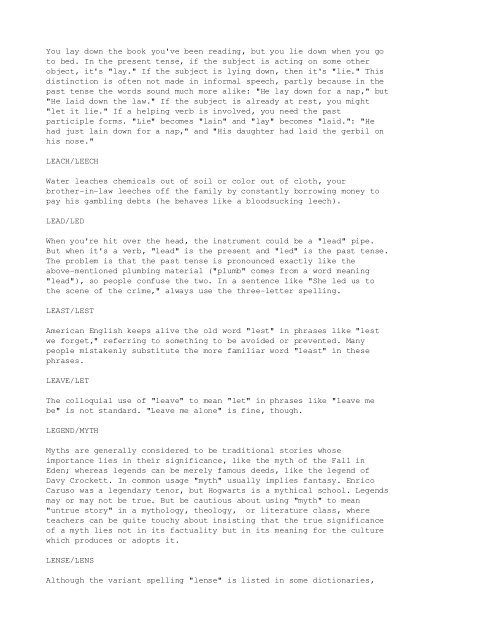Common_Errors_in_English_usage
Common_Errors_in_English_usage
Common_Errors_in_English_usage
Create successful ePaper yourself
Turn your PDF publications into a flip-book with our unique Google optimized e-Paper software.
You lay down the book you've been read<strong>in</strong>g, but you lie down when you go<br />
to bed. In the present tense, if the subject is act<strong>in</strong>g on some other<br />
object, it's "lay." If the subject is ly<strong>in</strong>g down, then it's "lie." This<br />
dist<strong>in</strong>ction is often not made <strong>in</strong> <strong>in</strong>formal speech, partly because <strong>in</strong> the<br />
past tense the words sound much more alike: "He lay down for a nap," but<br />
"He laid down the law." If the subject is already at rest, you might<br />
"let it lie." If a help<strong>in</strong>g verb is <strong>in</strong>volved, you need the past<br />
participle forms. "Lie" becomes "la<strong>in</strong>" and "lay" becomes "laid.": "He<br />
had just la<strong>in</strong> down for a nap," and "His daughter had laid the gerbil on<br />
his nose."<br />
LEACH/LEECH<br />
Water leaches chemicals out of soil or color out of cloth, your<br />
brother<strong>in</strong>law leeches off the family by constantly borrow<strong>in</strong>g money to<br />
pay his gambl<strong>in</strong>g debts (he behaves like a bloodsuck<strong>in</strong>g leech).<br />
LEAD/LED<br />
When you're hit over the head, the <strong>in</strong>strument could be a "lead" pipe.<br />
But when it's a verb, "lead" is the present and "led" is the past tense.<br />
The problem is that the past tense is pronounced exactly like the<br />
abovementioned plumb<strong>in</strong>g material ("plumb" comes from a word mean<strong>in</strong>g<br />
"lead"), so people confuse the two. In a sentence like "She led us to<br />
the scene of the crime," always use the threeletter spell<strong>in</strong>g.<br />
LEAST/LEST<br />
American <strong>English</strong> keeps alive the old word "lest" <strong>in</strong> phrases like "lest<br />
we forget," referr<strong>in</strong>g to someth<strong>in</strong>g to be avoided or prevented. Many<br />
people mistakenly substitute the more familiar word "least" <strong>in</strong> these<br />
phrases.<br />
LEAVE/LET<br />
The colloquial use of "leave" to mean "let" <strong>in</strong> phrases like "leave me<br />
be" is not standard. "Leave me alone" is f<strong>in</strong>e, though.<br />
LEGEND/MYTH<br />
Myths are generally considered to be traditional stories whose<br />
importance lies <strong>in</strong> their significance, like the myth of the Fall <strong>in</strong><br />
Eden; whereas legends can be merely famous deeds, like the legend of<br />
Davy Crockett. In common <strong>usage</strong> "myth" usually implies fantasy. Enrico<br />
Caruso was a legendary tenor, but Hogwarts is a mythical school. Legends<br />
may or may not be true. But be cautious about us<strong>in</strong>g "myth" to mean<br />
"untrue story" <strong>in</strong> a mythology, theology, or literature class, where<br />
teachers can be quite touchy about <strong>in</strong>sist<strong>in</strong>g that the true significance<br />
of a myth lies not <strong>in</strong> its factuality but <strong>in</strong> its mean<strong>in</strong>g for the culture<br />
which produces or adopts it.<br />
LENSE/LENS<br />
Although the variant spell<strong>in</strong>g "lense" is listed <strong>in</strong> some dictionaries,





